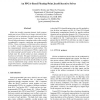Free Online Productivity Tools
i2Speak
i2Symbol
i2OCR
iTex2Img
iWeb2Print
iWeb2Shot
i2Type
iPdf2Split
iPdf2Merge
i2Bopomofo
i2Arabic
i2Style
i2Image
i2PDF
iLatex2Rtf
Sci2ools
ISPAN
2005
IEEE
2005
IEEE
An FPGA-Based Floating-Point Jacobi Iterative Solver
Within the parallel computing domain, field programmable gate arrays (FPGA) are no longer restricted to their traditional role as substitutes for application-specific integrated circuits–as hardware “hidden” from the end user. Several high performance computing vendors offer parallel reconfigurable computers employing user-programmable FPGAs. These exciting new architectures allow end-users to, in effect, create reconfigurable coprocessors targeting the computationally intensive parts of each problem. The increased capability of contemporary FPGAs coupled with the embarrassingly parallel nature of the Jacobi iterative method make the Jacobi method an ideal candidate for hardware acceleration. This paper introduces a parameterized design for a deeply pipelined, highly parallelized IEEE 64-bit floating-point version of the Jacobi method. A Jacobi circuit is implemented using a Xilinx Virtex-II Pro as the target FPGA device. Implementation statistics and performance estimates ...
Distributed And Parallel Computing | ISPAN 2005 | Jacobi Iterative Method | Jacobi Method | Parallel Computing Domain |
| Added | 25 Jun 2010 |
| Updated | 25 Jun 2010 |
| Type | Conference |
| Year | 2005 |
| Where | ISPAN |
| Authors | Gerald R. Morris, Viktor K. Prasanna |
Comments (0)

